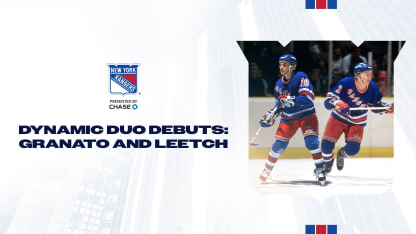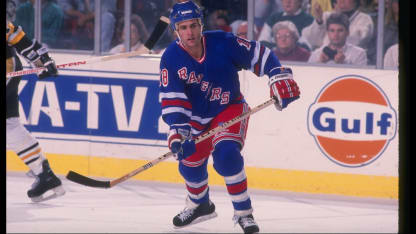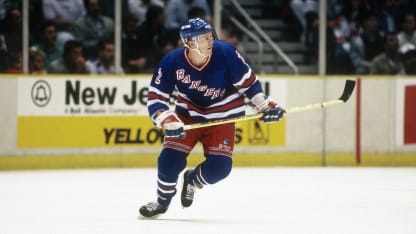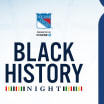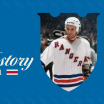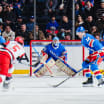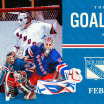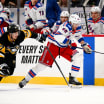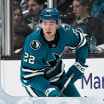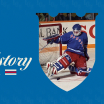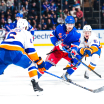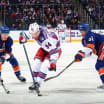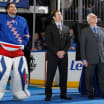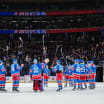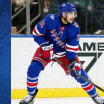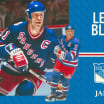From Granato’s perspective, there was no doubt that Leetch would be successful in the upcoming season and in his career.
“The skillset he had for how he could see and think the game as a young player was better than anyone that I have ever been around and played with,” Granato said of Leetch. “He was at a whole different level in terms of skillset. And with Brian, you don’t necessarily see the competitiveness in him until you get into games and competition. He always demanded a lot of himself and he always expected to perform at an elite level. I think the competitiveness he had is somewhat overlooked by how skilled he was, but when you put pads on and get in a game, he was as competitive as anyone I ever played with.”
Leetch and Granato both made the Rangers’ opening night roster, and almost immediately, they both made an impact on the team that would last throughout the season. Granato – who switched from jersey No. 39 to jersey No. 18 after his fifth career NHL game – posted a four-goal game in just his 11th career contest; that game resulted in a 9-2 win over the Penguins, which extended the Rangers’ winning streak to seven and gave the team a league-best 8-2-1 record to begin the campaign.
Leetch also had four points in that game, and by the time the season was only 20 games old, he and Granato were already being discussed as candidates for the Calder Trophy as the NHL’s Rookie of the Year. Near the end of November, Lafleur said that Leetch, “has a little bit of (Paul) Coffey, (and) a little bit of (Ray) Bourque,” referencing the two defensemen who had won the Norris Trophy as the NHL’s Best Defenseman in each of the four previous seasons.
Regarding Granato, Phil Esposito – the Rangers’ General Manager at the time – told The Vancouver Sun before a game between the Rangers and Canucks in early December that, “the thing I love about him is his emotion and enthusiasm. Right now he wants it, and, to me, that means much more than talent.”
The Canucks had a superb rookie of their own in Trevor Linden, who had been selected with the second overall pick in the 1988 NHL Entry Draft. Linden, like the Rangers’ star rookies, was among the group of players that were mentioned for consideration for the Calder Trophy. When the finalists were announced at the end of the season, Leetch, Granato, and Linden were the three rookies nominated for the award.
But, according to a humble Granato, there was one player who stood above the rest.
“The thing I knew most was that Brian Leetch was the better player (between the two of us),” Granato said. “As a defenseman and the impact he had on our team, just to be considered in the same group of players with him and Trevor Linden was just an honor for me. The right guy won the award. He probably should have been in contention to be an MVP when I look back on the impact that he had on our team.
“It was a fun year, especially to do it with Brian and to do it with a group of guys that really welcomed us as young players.”
Leetch finished the 1988-89 season with 23 goals – setting an NHL record for goals in season by a rookie defenseman – and 71 points. Granato led all rookies – and led all Rangers players – with 36 goals in 1988-89, establishing a Rangers rookie record for goals in a season that still stands today. Although Granato didn’t win the Calder Trophy, his goal scoring ability and tenacious play made him a fan favorite and earned him one of the most prestigious honors a Rangers player can receive – the Steven McDonald Extra Effort Award.
Midway through the 1989-90 season, Granato was involved in a trade between the Rangers and the Los Angeles Kings, ending his tenure with the Blueshirts after only 115 regular season games. But for Granato – who returned to MSG as a Rangers alum to watch a playoff game last year – the memories of that special 1988-89 season has kept him connected to the team and place where he began his NHL career.
“I loved being a Ranger,” Granato said. “When I went back last year in the playoffs, it was the first game where I went back as a Ranger; I had been in the building many times before as a visiting player and visiting coach. To go in the building, walk inside The Garden with the fans, and sit with the fans and cheer for the Rangers was really special, and it brought back lots of memories.
“It brought back how lucky and special it was to have been part of the Rangers organization.”

